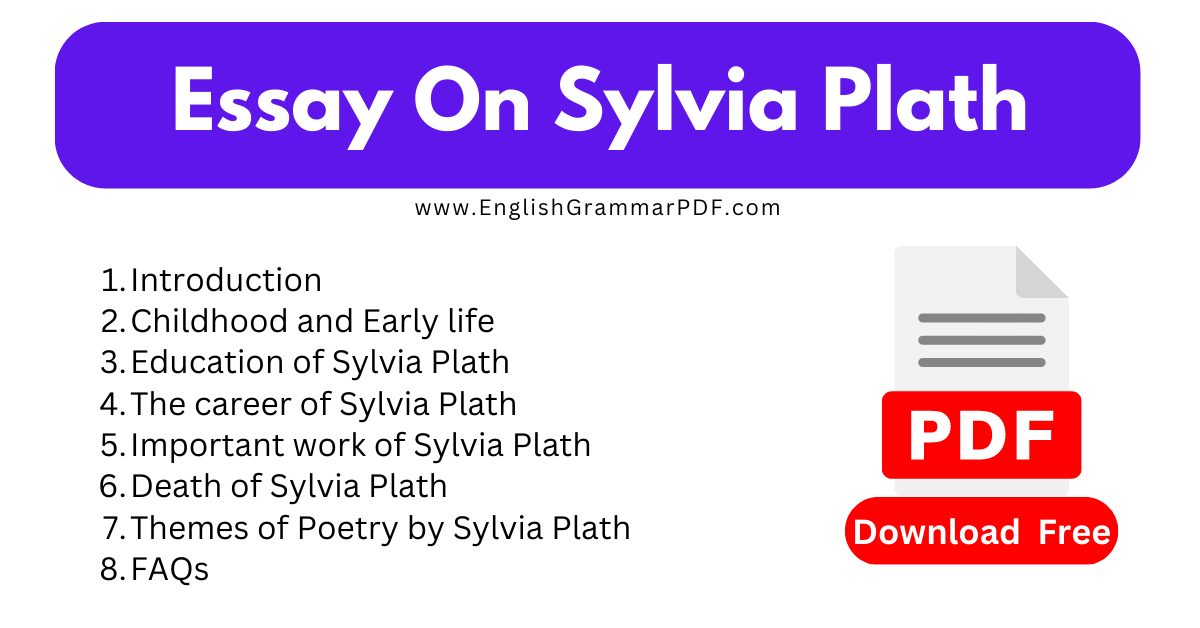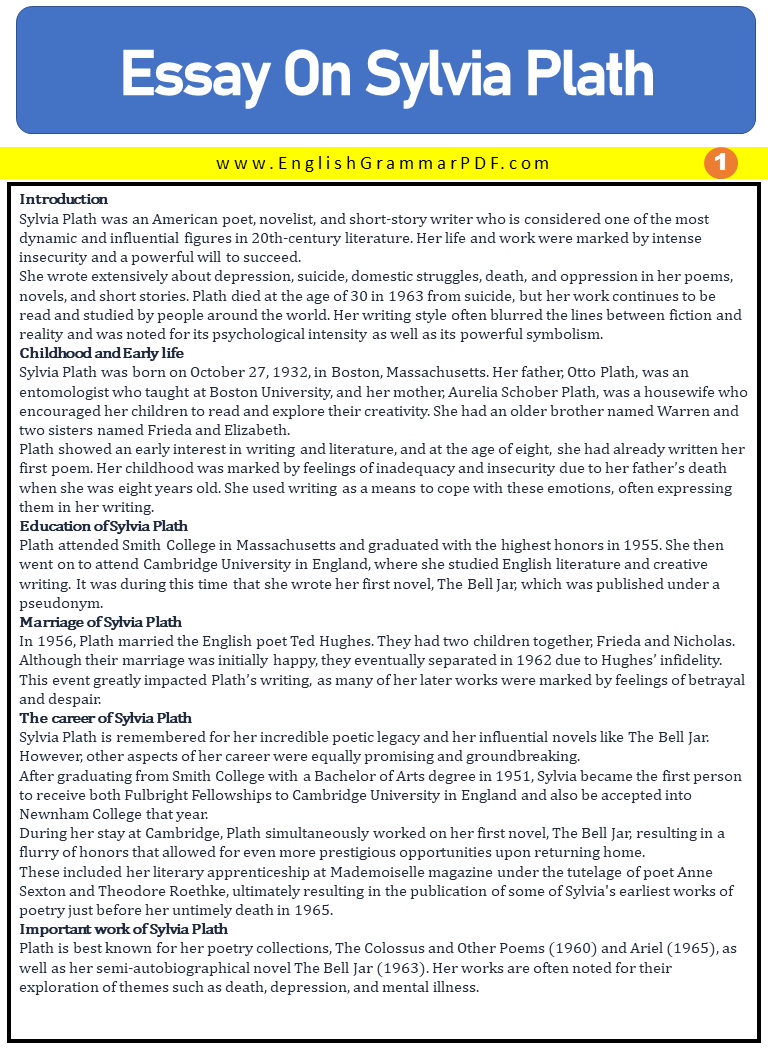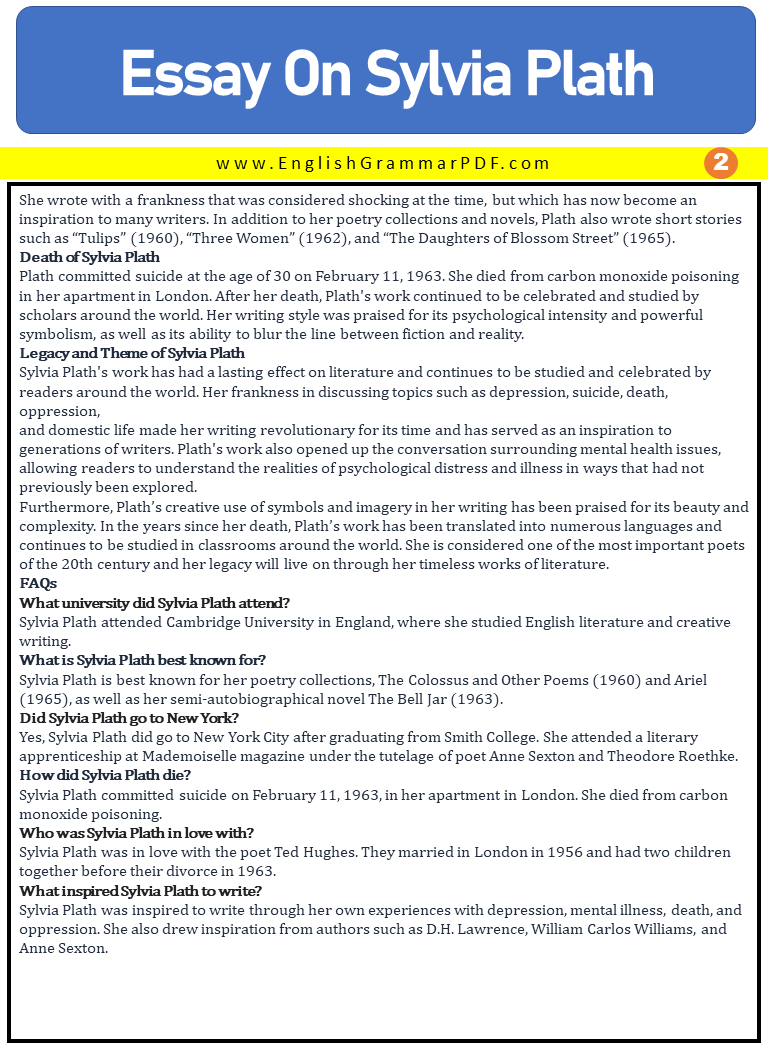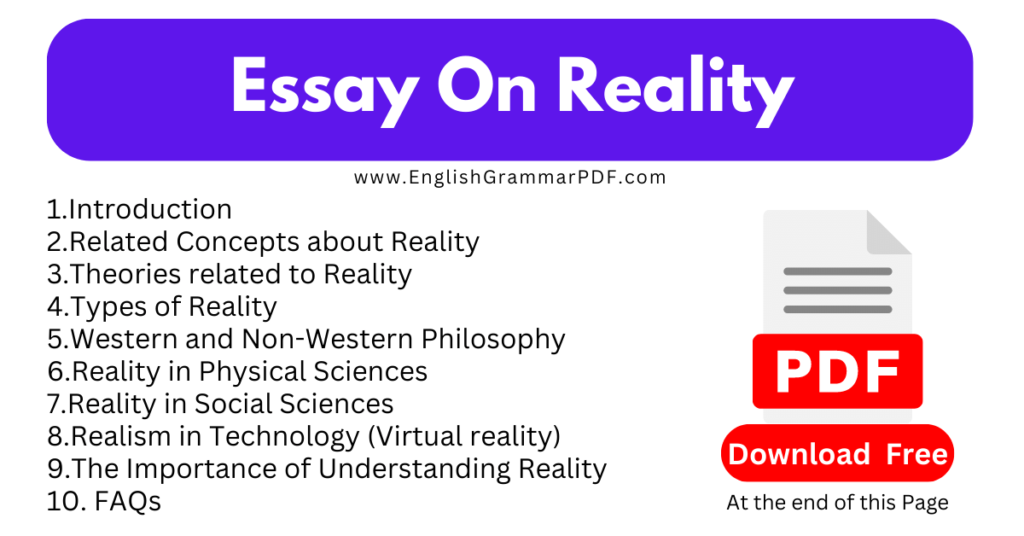Essay On Sylvia Plath (Structure/Outline)
- Introduction
- Childhood and Early life
- Education of Sylvia Plath
- The career of Sylvia Plath
- Important work of Sylvia Plath
- Death of Sylvia Plath
- Themes of Poetry by Sylvia Plath
- FAQs
Introduction
Sylvia Plath was an American poet, novelist, and short-story writer who is considered one of the most dynamic and influential figures in 20th-century literature. Her life and work were marked by intense insecurity and a powerful will to succeed.
She wrote extensively about depression, suicide, domestic struggles, death, and oppression in her poems, novels, and short stories. Plath died at the age of 30 in 1963 from suicide, but her work continues to be read and studied by people around the world. Her writing style often blurred the lines between fiction and reality and was noted for its psychological intensity as well as its powerful symbolism.
Childhood and Early life
Sylvia Plath was born on October 27, 1932, in Boston, Massachusetts. Her father, Otto Plath, was an entomologist who taught at Boston University, and her mother, Aurelia Schober Plath, was a housewife who encouraged her children to read and explore their creativity. She had an older brother named Warren and two sisters named Frieda and Elizabeth.
Plath showed an early interest in writing and literature, and at the age of eight, she had already written her first poem. Her childhood was marked by feelings of inadequacy and insecurity due to her father’s death when she was eight years old. She used writing as a means to cope with these emotions, often expressing them in her writing.
Education of Sylvia Plath
Plath attended Smith College in Massachusetts and graduated with the highest honors in 1955. She then went on to attend Cambridge University in England, where she studied English literature and creative writing. It was during this time that she wrote her first novel, The Bell Jar, which was published under a pseudonym.
Marriage of Sylvia Plath
In 1956, Plath married the English poet Ted Hughes. They had two children together, Frieda and Nicholas. Although their marriage was initially happy, they eventually separated in 1962 due to Hughes’ infidelity. This event greatly impacted Plath’s writing, as many of her later works were marked by feelings of betrayal and despair.
The career of Sylvia Plath
Sylvia Plath is remembered for her incredible poetic legacy and her influential novels like The Bell Jar. However, other aspects of her career were equally promising and groundbreaking.
After graduating from Smith College with a Bachelor of Arts degree in 1951, Sylvia became the first person to receive both Fulbright Fellowships to Cambridge University in England and also be accepted into Newnham College that year.
During her stay at Cambridge, Plath simultaneously worked on her first novel, The Bell Jar, resulting in a flurry of honors that allowed for even more prestigious opportunities upon returning home.
These included her literary apprenticeship at Mademoiselle magazine under the tutelage of poet Anne Sexton and Theodore Roethke, ultimately resulting in the publication of some of Sylvia’s earliest works of poetry just before her untimely death in 1965.
Important work of Sylvia Plath
Plath is best known for her poetry collections, The Colossus and Other Poems (1960) and Ariel (1965), as well as her semi-autobiographical novel The Bell Jar (1963). Her works are often noted for their exploration of themes such as death, depression, and mental illness.
She wrote with a frankness that was considered shocking at the time, but which has now become an inspiration to many writers. In addition to her poetry collections and novels, Plath also wrote short stories such as “Tulips” (1960), “Three Women” (1962), and “The Daughters of Blossom Street” (1965).
Death of Sylvia Plath
Plath committed suicide at the age of 30 on February 11, 1963. She died from carbon monoxide poisoning in her apartment in London. After her death, Plath’s work continued to be celebrated and studied by scholars around the world. Her writing style was praised for its psychological intensity and powerful symbolism, as well as its ability to blur the line between fiction and reality.
Legacy and Theme of Sylvia Plath
Sylvia Plath’s work has had a lasting effect on literature and continues to be studied and celebrated by readers around the world. Her frankness in discussing topics such as depression, suicide, death, oppression,
and domestic life made her writing revolutionary for its time and has served as an inspiration to generations of writers. Plath’s work also opened up the conversation surrounding mental health issues, allowing readers to understand the realities of psychological distress and illness in ways that had not previously been explored.
Furthermore, Plath’s creative use of symbols and imagery in her writing has been praised for its beauty and complexity. In the years since her death, Plath’s work has been translated into numerous languages and continues to be studied in classrooms around the world. She is considered one of the most important poets of the 20th century and her legacy will live on through her timeless works of literature.
FAQs
What university did Sylvia Plath attend?
Sylvia Plath attended Cambridge University in England, where she studied English literature and creative writing.
What is Sylvia Plath best known for?
Sylvia Plath is best known for her poetry collections, The Colossus and Other Poems (1960) and Ariel (1965), as well as her semi-autobiographical novel The Bell Jar (1963).
Did Sylvia Plath go to New York?
Yes, Sylvia Plath did go to New York City after graduating from Smith College. She attended a literary apprenticeship at Mademoiselle magazine under the tutelage of poet Anne Sexton and Theodore Roethke.
How did Sylvia Plath die?
Sylvia Plath committed suicide on February 11, 1963, in her apartment in London. She died from carbon monoxide poisoning.
Who was Sylvia Plath in love with?
Sylvia Plath was in love with the poet Ted Hughes. They married in London in 1956 and had two children together before their divorce in 1963.
What inspired Sylvia Plath to write?
Sylvia Plath was inspired to write through her own experiences with depression, mental illness, death, and oppression. She also drew inspiration from authors such as D.H. Lawrence, William Carlos Williams, and Anne Sexton. Additionally, Plath’s writing style was influenced by the literary movements of Modernism and Postmodernism.
Essay On Sylvia Plath (Pictures & PDF)



Related: Free Essay On Summer
Download this essay in PDF, Below.


